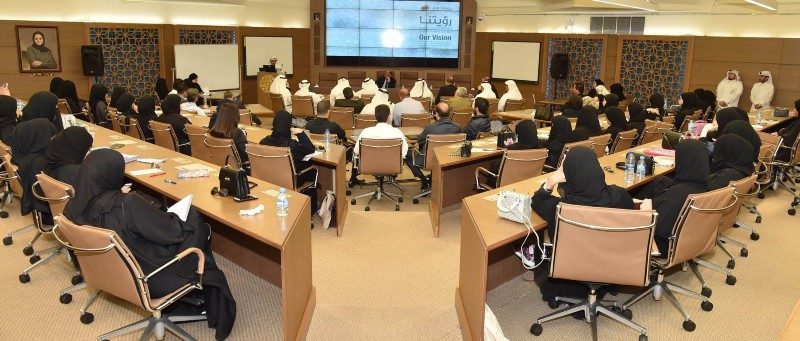
Hundreds of Qatar University students and community members have been debating gender segregation in school and society this week.
The discussion was sparked by a woman who was recently elected to the student union of QU’s College of Sharia and Islamic Studies, but then objected about the meetings being mixed.
Last month, Mariam Al-Dosari began complaining that the union was not accommodating her request to attend the meetings via video conference, so that she wouldn’t have to meet with male students face-to-face.
https://twitter.com/MA_HD17/status/831539713160966144
Translation: It is really strange that the student council meetings are gender-mixed as it contradicts Qatar University’s segregation policy in classes.
A few weeks later, in early March, Al-Dosari began complaining that her requests were not being met.
Hashtag debate
This led to the creation of a now-viral hashtag on Twitter, كلنا_مريم_الدوسري# (We are all Mariam Al-Dosari).
Many people who engaged in the debate said they sympathized with Al-Dosari’s plight, saying her request should have been honored.
Others saw the issue as an attempt to westernize Qatar in a way that goes against the country’s traditions and values.
#كلنا_مريم_الدوسري مسكين من يعتقد أن القضية في شخص مريم ، ولكن القضية قضية مبدأ تربوا عليه عفيفات قطر، وسيظهر الحق ولو بعد حين .
— فاطمه الدوسري (@F_aldosari) March 13, 2017
Translation: I pity those who reduce this issue to make it only about Mariam. It simply isn’t. It’s a matter of principle; an issue pertaining to the chaste women of Qatar and the values virtue and modesty they were brought up with. Sooner or later the truth will prevail.
في بلادها ومن حقها بتعليم يتوافق مع عاداتها وتقاليدها #كلنا_مريم_الدوسري
— عبدالعزيز الدوسري (@abdlazizqt) March 13, 2017
Translation: She lives in her home country and has a right to an education that suits her traditions and values.
لأننا نعلمهم الحرية والديمقراطية
نُعاقب الطالبة بإخراجها من المجلس
بل ونفقد أعصابنا بالصراخ عليها وكأن إخراجها لا يكفي!!!#كلنا_مريم_الدوسري— محمد الشيب (@msalsheeb) March 13, 2017
Translation: Instead of teaching students freedom of expression and democracy a student is being punished by being expelled from the student council and then to add insult to injury, she gets yelled at as if expulsion isn’t enough.
Counterpoints
But many others said it was unreasonable to always expect things to be segregated by gender.
Some critics pointed out that Al-Dosari knew the format of the meetings before she became a representative.
And a few said students are capable of meeting each other in mixed company without anything untoward happening.
https://twitter.com/noudieqtr97/status/841324791625859073
Translation: What kind of empowerment and enablement are you searching for and wishing to achieve in the future when you already refuse to attend official public meetings?
https://twitter.com/ra3eewajb/status/841139063293894656
Translation: The seatings at the meetings are divided, the front rows are for female students and the back ones for males or the other way around. They don’t even sit next to each other.
Qatar University has not officially weighed in on the discussion, nor has the student union.
On Twitter, some have suggested that Al-Dosari is no longer on the student council, but she has not confirmed this.
A better future
For some, the debate raises a larger question about men and women’s interaction in society.
In an opinion piece this week, QU alum Shabeb Al Rumaihi pointed out that many of his university’s annual events, conferences and movie screenings were not segregated affairs.
“You can not bring a head of state or an international actor to give two separate lectures,” he said.
He added that he didn’t feel mixed events threatened Qatar’s cultural values, and that this helps facilitate female leadership.
“I see it as an opportunity to innovate a new cultural platform that believes in developing a society that needs men and women working together to develop a better future for Qatar.”
He concluded by pointing that during his undergraduate years, there were three female college deans at QU. Now, there’s only one.
Thoughts?